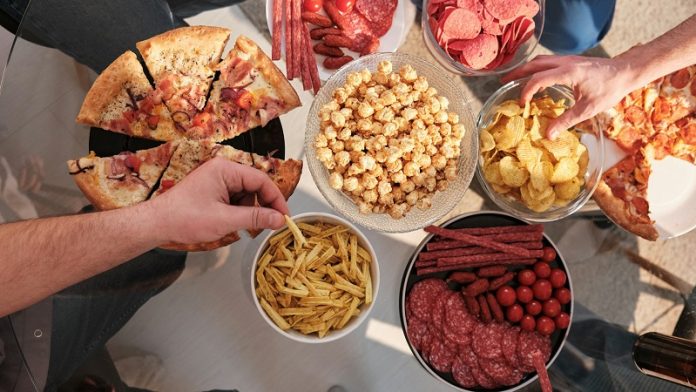
A recent study from The University of Texas at Austin has found that eating more ultra-processed foods—like diet sodas, packaged crackers, certain cereals, and yogurts—can lead to higher blood sugar levels in people with type 2 diabetes.
This type of food has been linked to worse blood sugar control, making it more difficult for people with diabetes to manage their condition.
The study, published in the Journal of the Academy of Nutrition and Dietetics, showed that consuming more ultra-processed foods is closely associated with increased levels of HbA1C. HbA1C is a measure of average blood sugar levels over several months.
Researchers found that even beyond the sugar and salt content in a person’s diet, it’s the additives in ultra-processed foods that can lead to worse blood sugar control.
“We wanted to see which aspect of a person’s diet was most connected to blood sugar control in people with type 2 diabetes,” said Marissa Burgermaster, the study’s senior author and assistant professor of nutritional sciences.
“We discovered that the more ultra-processed foods people ate, the worse their blood sugar control became.
On the other hand, eating more whole or minimally processed foods helped people keep their blood sugar in check.”
The study involved 273 African American adults with type 2 diabetes, recruited from Austin-area churches as part of a larger trial called Texas Strength Through Resilience in Diabetes Education (TX STRIDE).
Participants were asked to recall everything they ate over two 24-hour periods, and their blood samples were tested for HbA1C levels.
The researchers discovered that the amount of ultra-processed food in a person’s diet was directly related to worse blood sugar control.
In contrast, those who ate more minimally processed or unprocessed foods had better blood sugar levels.
Interestingly, tools that typically measure the overall quality of a person’s diet did not show this link, indicating that it wasn’t just about sugar or sodium. Instead, the researchers suspect that synthetic additives like flavors, colors, and artificial sweeteners might play a role in the poor blood sugar control linked to ultra-processed foods.
For people not using insulin therapy, the study showed that a diet with 10% more ultra-processed food led to an average increase of 0.28 percentage points in HbA1C. On the flip side, eating 10% more minimally processed or whole foods led to an average decrease of 0.30 percentage points in HbA1C.
Maintaining an HbA1C level below 7 is ideal for people with type 2 diabetes, and those who ate 18% or fewer ultra-processed foods were more likely to achieve this goal.
This study suggests that people with diabetes should be mindful of how much ultra-processed food they consume and focus on eating more whole or minimally processed foods to better control their blood sugar.
If you care about diabetes, please read studies about 5 vitamins that may prevent complication in diabetes, and how to manage high blood pressure and diabetes with healthy foods.
For more health information, please see recent studies about vitamin D and type2 diabetes, and to people with type 2 diabetes, some fruits are better than others.



